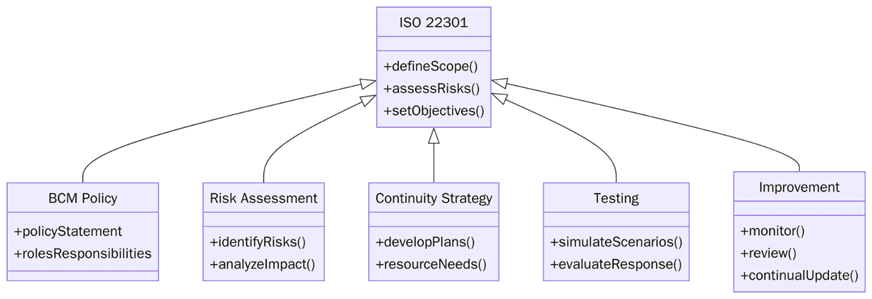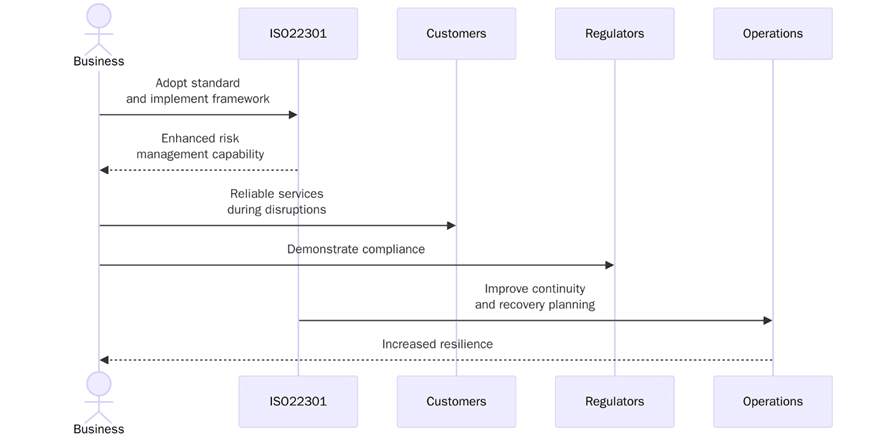ISO 22301 in Chicago: Building Resilient Business Operations

ISO 22301 is an international standard for Business Continuity Management Systems (BCMS). This standard creates a structured approach for organizations to create and sustain their business continuity plans, ensuring that they can operate throughout and following disruptive events. For businesses in Chicago, a city that is famous for its economy and diverse businesses with their own challenges such as natural disasters, economic cycles and global disruptions. ISO 22301 certification can be used as a helpful tool for resilience and manage critical risk in terms of maintaining operation during times of disruption.
This blog will explore how ISO 22301 can be strategic for Chicago-based businesses to build resilient operations, create risk management processes, and support sustainable operations into the future.
For assistance, contact us at [email protected].
Introduction
Chicago, one of the largest business centres in the United States is home to a variety of organizations across sectors like finance, manufacturing, healthcare and logistics. For businesses in these sectors, continued operations is critical to meeting customer commitments, protecting data and industry regulations. Disruptions related to power outages, supply chain limitations or unplanned crisis can greatly affect business, operations and customer assurance.
ISO 22301 provides a detailed model for developing business continuity plans organizations can use to address their risk and recovery from an interruption to normal operations. By employing ISO 22301 as a basis for certification, companies in Chicago can show their commitment to resilience, mitigate operational downtime and add value to their brand.
How ISO 22301 Helps businesses build resilient operations?
ISO 22301 is designed to guide organizations through the process of establishing, implementing, and maintaining effective business continuity management systems. It covers a wide range of elements critical for ensuring that a business can continue operations in the face of disruptions, including risk management, planning, communication and recovery procedures.

ISO 22301 requires businesses to evaluate possibilities of future risks and vulnerabilities of the organization that could affect its ability to continue operations. Businesses can identify lakes in business resilience through risk evaluations and evaluations of all potential threats to the organization, resulting in plans to address the impact of the risks.
ISO 22301 provides a platform for businesses to develop specific continuity plans while knowing they will imbibe their individual business goals and objects. Businesses will be able to work collaboratively through the process of documentation and thereby developing a business role to encompass all features of the business including how to look after the business and critically evaluating of business processes and the role of staff in any plans, including continuity around technology and supply chain.
ISO 22301 assists organizations in defining and implementing recovery strategies to help restore critical functions as quickly as possible after a disruption. In particular, it defines the process for identifying recovery time objectives (RTOs) and recovery point objectives (RPOs) for vital business functions, and ensures access to appropriate resources and personnel to undertake recovery.
ISO 22301 cultivates a continuous improvement culture through its requirement that organizations always review their business continuity plans (BCPs) in order to document approved updates based on the changing risks for the organization and business continuity needs as well as lessons learned from prior disruptions
What are the benefits of ISO 22301 for businesses in Chicago?
ISO 22301 certification offers several key benefits for businesses in Chicago, particularly in terms of risk management, operational resilience and stakeholder trust.

ISO 22301 guides organizations in identifying, assessing, and mitigating risks that could disrupt business operations. This helps organizations reduce the probability of being impacted by severe disruptions if they implement an effective business continuity management system (BCMS) in their organization.
Attaining ISO 22301 certification delivers a message to customers that shows an organization understands disruptions can occur and that they are able to provide services across these disruptions, with minimal seriousness. This is an important opportunity to grow customer trust, as reliability in delivering British goods and/or services is well entrenched in certain sectors.
Many Chicago industries, such as finance, health services, and government, face regulated circumstances that coincide with business continuity and risk. Achieving ISO 22301 may help organizations remain compliant with such regulatory requirements and avoid the issues of financial penalties.
By managing business continuity in a meaningful way, ISO 22301 can help organizations to reduce downtime and mitigate their recovery efforts. This allows for revenue to be maintained, which is a key driver behind improving financial performance, even in the context of cost.
ISO 22301 requires organizations to involve employees in the development and implementation of business continuity plans. This ensures that employees are trained and aware of their roles during a crisis, which enhances their ability to respond effectively and contribute to the organization’s resilience efforts.
How to Get ISO 22301 certified in Chicago?
Achieving ISO 22301 certification involves several key steps which help organizations develop and implement an effective business continuity management system.
Establish a Business Continuity Management System (BCMS): The first step in solving any problem is to put together a BCMS, which outlines the how and what it does, and the policies, procedures, and roles that are necessary to manage business continuity. The BCMS itself serves as the touchstone for everything that follows.
Conduct a Business Impact Analysis (BIA): Execute a business impact analysis (BIA), which identifies important business functions and processes, judges the impact of potential interruptions and advises prioritization for recovery.
Risk Assessment & Mitigation: Identify likely risks that can impact business operations, and identify strategies for mitigating those risks. Understanding risks could entail physical threats, cybersecurity risks, or risks tied to supply chain interruptions.
Develop Business Continuity Plans: Document detailed business continuity plans for what actions will take place in light of a disruption, recovery procedures to restore business operations, communication strategies for dealing with service users, and resource and training requirements.
Testing and Training: Test business continuity plans regularly to ensure the plans are effective and to inform employees when they need to implement the plans. Employees must administer business continuity plan and appropriate training and testing session to acclimatize them with the plans and document various exercises to suit the various stages of "recovery".
Internal and External Audits: Internal audits assess the effectiveness of the BCMS. In addition, there's a need for an accredited certification body to complete an external audit to verify compliance with ISO 22301 standards.
Continuous Improvement: Regularly review and improve the BCMS based on the outcomes of audits, exercises, and feedback from employees and stakeholders.
Conclusion
ISO 22301 certification empowers Chicago-based businesses to formalise and strengthen their approach to risk management, resilience and uninterrupted operations in the face of disruptions. By implementing a Business Continuity Management System (BCMS) aligned with ISO 22301 requirements, organisations gain a structured framework to identify risks, develop tested continuity plans and recover critical functions quickly after incidents such as natural disasters, supply-chain breakdowns or system failures.
This level of preparedness not only reduces operational downtime and financial loss but also enhances stakeholder and customer confidence in the organisation’s ability to sustain service delivery under pressure. While certification is not mandatory, achieving it signals commitment to resilience, regulatory readiness and proactive risk control — giving certified companies a competitive edge in Chicago’s diverse and dynamic business landscape.
Contact Us
Pacific Certifications can assist your organization in navigating the ISO 22301 certification process. Our team of experts will help you establish a comprehensive business continuity management system, ensuring that your operations remain resilient in the face of disruptions.
If you need support with ISO 22301 in Chicago, contact us at [email protected].
Read More at: Blogs by Pacific Certifications

